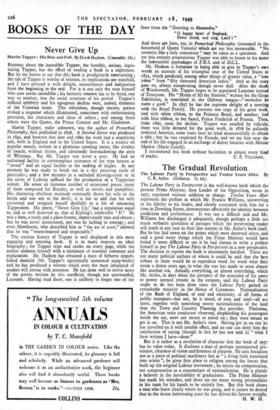The Gradual Revolution
The Labour Party in Perspective and Twelve Years After. By C. R. Attlee. (Gollancz. 7s. 6d.)
The Labour Party in Perspective is the well-known book which the present Prime Minister, then Leader of the Opposition, wrote in 5937, reprinted without addition or change. Twelve Years After represents the preface in which Mr. Francis Williams, unswerving in his fidelity to his leader, and closely associated with him for a time in Downing Street, demonstrates effectively the identity between prediction and performance. It was not a difficult task and Mr. Williams has discharged it adequately, though perhaps a little too much verbatim quotation of passages which the persevering reader will reach in any case in their due context in Mr. Attlee's book itself. But he has laid stress on the points which most deserved stress, and said a good many things which the Prime Minister would have fotind it more difficult to say it he had chosen to write a preface himself to put The Labour Party in Perspective in a new perspective. The decision to reprint the book is abundantly justified. There are not many political authors of whom it could be said that the best tribute to them would be to reproduce word for word what they wrote a dozen years ago, in what the war has made to seem almost like another era. Actually everything, or almost everything, which Mr. Attlee, in days when the prospect of the accession of his party to power seemed remote in the extreme, said the Labour Party ought to do has been done since the Labour Party gained its remarkable majority in the House of Commons. Nationalisation of the Bank of England, of coal and electricity, of all forms of public transport—but not, be it noted, of iron and steel—all are there, together with something nearer nationalisation of the land than the Town and Country Planning Act provides. Platforms, the American train conductor observed, shepherding his passengers inside the car, were not meant to travel on ; they were meant to get in on. That is not Mr. Attlee's view. Having got in on one he has travelled on it with notable effect, and no one can deny him, the satisfaction of saying (though in fact he has not said it) " what I have written I have—done."
But it is rather as a revelation of character that the book of 5937 has its value today. It discloses a man of perhaps unsuspected pre- science, clearness of vision and firmness of purpose. He sees Socialism not as a piece of political machinery but as " a living faith translated into action "; he gives first place to religion among the forces that built up the original Labour movement ; he insists on compensation, not compensation as a concomitant of nationalisation. He is plainly a believer in the inevitability of gradualness. The Prime Minister has made his mistakes, and there are too many strong personalities in his team for his hands to be entirely free. But this book shows a man who knew clearly where he was going, and it cannot be denied that in the dozen intervening years he has driven his furrow straight.
H. W. H.






































 Previous page
Previous page